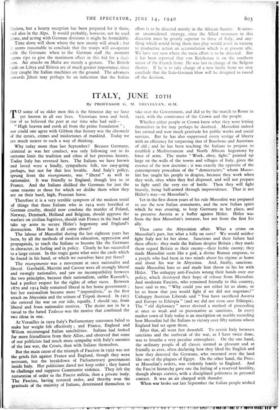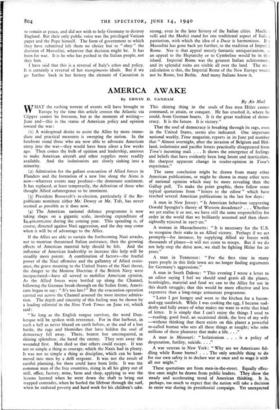ITALY, JUNE I OTH
By PROFESSOR G. M. TREVELYAN, O.M.
T0 some of us older men this is the bitterest day we have yet known in all our lives. Victorians born and bred, few of us believed the poet at our time who had said- " High heaven and earth ail from the prime foundation " ; nor could one agree with Gibbon that history was the chronicle of the errors, crimes and misfortunes of mankind. Today we are much nearer to such a way of thinking.
Why today more than last September? Because Germany, criminal as was her conduct, was only following out to its extreme limit the tradition and ethos of her previous history. Today Italy has reversed hers. The Italians we have known and loved were a kindly, sympathetic folk, too easy-going perhaps, but not for that less lovable. And Italy's policy, sprung from the risorgimento, was " liberal " as well as nationalist. It was friendly to England, though less so to France. And the Italians disliked the Germans for just the same reasons as those for which we dislike them when they are on their hard, high, Prussian horse.
Therefore it is a very terrible symptom of the modern trend of things that those Italians who in 1914 were horrified at German cruelty, should now condone the murder of Poland, Norway, Denmark, Holland and Belgium, should approve the warfare on civilian fugitives, should stab France in the back and take up arms to secure Hitler's hegemony and England's destruction. How has it all come about?
The labour of Mussolini during the last eighteen years has been, by all the methods of modern education, oppression and propaganda, to teach the Italians to become like the Germans in character, in feeling and in policy. Clearly he has succeeded to a large extent. In this tragic game what were the cards which he found in his hand, or which we ourselves have put there?
The risorgimento was a movement at once nationalist and liberal. Garibaldi, Mazzini and Cavour were all strongly liberal and strongly nationalist, and saw no incompatibility between the two principles, because their nationalism, unlike Kossuth's, had a perfect respect for the rights of other races. Between 1870 and 1914 Italy remained liberal in her home government ; but her nationalism became more " imperialistic," as the first attack on Abyssinia and the seizure of Tripoli showed. In 1915 she entered the war on our side, equally, I should say, from liberal and from nationalist motives. The desire not to be a vassal to the hated Tedesco was the motive that combined the two ideas in one.
At Versailles in 1919 Italy's Parliamentary statesmen failed to make her weight felt effectively ; and France, England and Wilson mismanaged Italian sensibilities. Italians had looked for more friendliness from their Allies, and observed that some of our publicists had much more sympathy with Italy's enemies of the late war, the Croats, than with Italians themselves.
But the main cause of the triumph of Fascism in 1922 was not the griefs felt against France and England, though they were assistant, but the breakdown of Parliamentary government inside Italy. Her politicians dared not keep order ; they feared to challenge and suppress Communist violence. They left the restoration of order to the Fascist militia, then a private body. The Fascists, having restored order, and thereby won the gratitude of the majority of Italians, determined themselves to take over the Government, and did so by the march to Rome in 1922, with the connivance of the Crown and the people.
Whether either people or Crown knew what they were letting themselves in for may perhaps be doubted. Mussolini indeed has earned and won much gratitude for public works and social services. But he has also suppressed every vestige of liberty with an efficiency far surpassing that of Bourbons and Austrians of old ; and he has been teaching the Italians to prepare to establish a Mediterranean and North African hegemony by force of arms. The motto " Work, obey, fight," painted up large on the walls of the towns and villages of Italy, gives the essence of the new doctrine ; it was exactly the opposite of the contemporary procedure of the " democracies," whom Musso- lini has taught his people to despise, because they work when they wish, obey when they feel disposed, and will not prepare to fight until the very eve of battle. Then they will fight bravely, being half-armed through improvidence. That is not Hitler's way—or Mussolini's.
Yet in the first dozen years of his rule Mussolini was prepared to use the new Italian armaments, and the new Italian spirit which he was creating, to keep Germany in her place, and to preserve Austria as a buffer against Hitler. Hider was from the first Mussolini's imitator, but not from the first his ally.
Then came the Abyssinian affair. What a crime on Mussolini's part, but what a folly on ours! We would neither fight Italy nor let her alone. Sanctions and their failure had these effects: they made the Italians despise Britain ; they made them regard Britain as their enemy—their feeble enemy; they made Mussolini seem like a god, a divine Roman emperor, to a people who had been in two minds about his regime at home and about his war in Abyssinia. And, finally, sanctions made Mussolini hate us and made him throw in his lot with Hitler. The unhappy anti-Fascists wrung their hands over our policy, which destroyed their hope of release from Mussolini. And moderate Fascists, who remained friendly to this country, have said to me, " Why could you not either let us alone, or let us know that you would fight if we did not negotiate?" Unhappy Austrian Liberals said " You have sacrificed Austria and Europe to Ethiopia " (and we did not even save Ethiopia). The " old diplomacy " never devised a method of proceeding at once so weak and so provocative as sanctions. In every market town of Italy today is an inscription on marble recording how Mussolini led the Italians to victory over fifty nations whom England had set upon them.
After that, all went fast downhill. To revisit Italy between sanctions and the outbreak of the war, as I have twice done, was to breathe a very peculiar atmosphere. On the one hand, the ordinary people of all classes seemed as pleasant and as friendly as ever, often declaring how they liked the English and how they detested the Germans, who swarmed over the land like one of the plagues of Egypt. On the other hand, the Press, at Mussolini's orders, was violently hostile to England. And the Fascist hierarchy gave one the feeling of a reserved hostility, though always correct, with a disciplined politeness in personal contact. It was an air charged with thunder.
When war broke out last September the Italian people wished to remain at peace, and did not wish to help Germany to destroy England. But their only public voice was the privileged Vatican paper and the Pope himself. The form of government to which they have submitted left them no choice but to " obey " the decision of Mussolini, whatever that decision might be. It has been for war. It is he who has pushed in the Italian people, not they him.
I have said that this is a reversal of Italy's ethos and policy. It is certainly a reversal of her risorgimento ideals. But if we go further back in her history the element of Caesarism is strong, even in the later history of the Italian cities. MachL- velli and the Medici stand for one traditional aspect of Italia n patriotism, with which the idea of a Duce is harmonious. Bi t Mussolini has gone back yet further, to the tradition of Imperil Rome. Nor is that appeal merely fantastic antiquarianism, as an appeal to the Heptarchy or to Cymbeline would be in this island. Imperial Rome was the greatest Italian achievemenr, and its splendid ruins are visible all over the land. The mis- calculation is this, the Imperial Rome of the New Europe would not be Rome, but Berlin. And many Italians know it.































 Previous page
Previous page